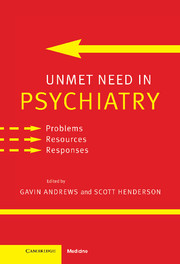Book contents
- Frontmatter
- Contents
- List of Contributors
- Preface
- Part I Unmet need: defining the problem
- Part II Unmet need: general problems and solutions
- Part III Unmet need: people with specific disorders
- Part IV Unmet need: specific issues
- Introduction
- 22 Unmet need in mental health service delivery: children and adolescents
- 23 Assessing psychopathology among children aged four to eight
- 24 Unmet need in Indigenous mental health: where to start?
- 25 Health systems research: a pragmatic model for meeting mental health needs in low-income countries
- 26 Disablement associated with chronic psychosis as seen by two groups of key informants: patients and mental health professionals
- 27 The assessment of perceived need
- 28 Public knowledge of and attitudes to mental disorders: a limiting factor in the optimal use of treatment services
- Part V Unmet need: conclusion
- Index
25 - Health systems research: a pragmatic model for meeting mental health needs in low-income countries
from Part IV - Unmet need: specific issues
Published online by Cambridge University Press: 21 August 2009
- Frontmatter
- Contents
- List of Contributors
- Preface
- Part I Unmet need: defining the problem
- Part II Unmet need: general problems and solutions
- Part III Unmet need: people with specific disorders
- Part IV Unmet need: specific issues
- Introduction
- 22 Unmet need in mental health service delivery: children and adolescents
- 23 Assessing psychopathology among children aged four to eight
- 24 Unmet need in Indigenous mental health: where to start?
- 25 Health systems research: a pragmatic model for meeting mental health needs in low-income countries
- 26 Disablement associated with chronic psychosis as seen by two groups of key informants: patients and mental health professionals
- 27 The assessment of perceived need
- 28 Public knowledge of and attitudes to mental disorders: a limiting factor in the optimal use of treatment services
- Part V Unmet need: conclusion
- Index
Summary
Summary
Mental illness is now recognized as an important cause of morbidity and disability worldwide. In particular, health priorities in low-income countries will need to achieve a balance between communicable and noncommunicable diseases, as alarming rates of depression, problem drinking and other mental disorders are reported in epidemiological surveys. Psychiatric research across different societies has polarized into two schools of thought. The universalist school prescribes that mental disorders are fundamentally the same everywhere and that epidemiological studies can ultimately lead to a body of information for local health workers on how to respond to mental health needs. The cultural relativist school argues that mental disorders are so influenced by culture that research must be conducted within specific cultures in order to make it valid and meaningful to local health workers.
The author argues that neither pole of research has made any significant impact on the understanding of mental disorders by general health workers in low-income countries because of the uneven emphasis placed on either biology or culture. On the other hand, health systems research (HSR) offers a pragmatic model for investigating worldwide mental health problems because of its recognition that mental illness and mental health care are profoundly influenced not only by culture and biology but by the complex interaction of numerous social, political, economic, historical and health service related factors, that is the various components of the health system.
Keywords
- Type
- Chapter
- Information
- Unmet Need in PsychiatryProblems, Resources, Responses, pp. 363 - 377Publisher: Cambridge University PressPrint publication year: 2000
- 3
- Cited by

